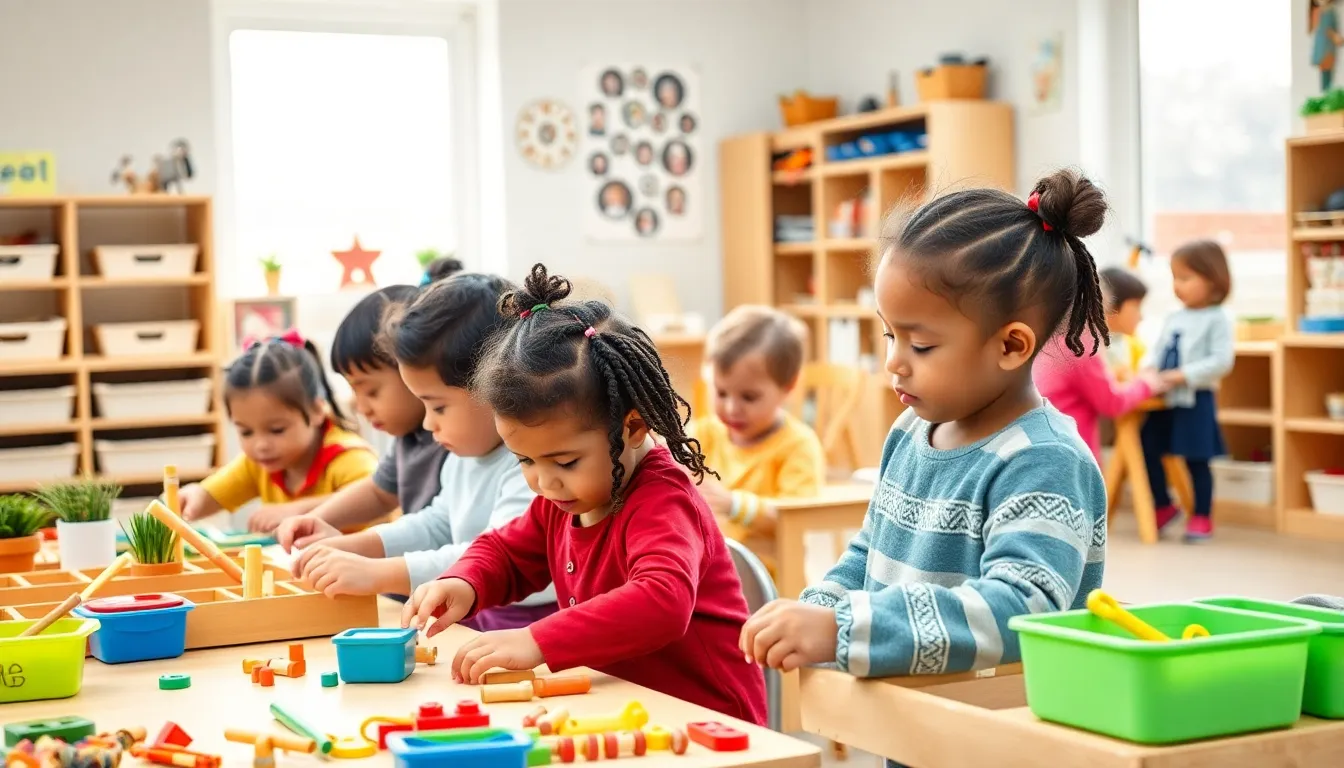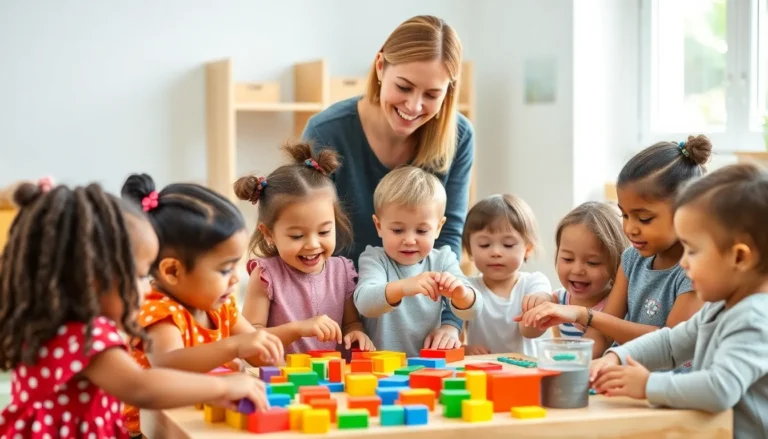Table of Contents
ToggleThe Montessori curriculum offers a unique approach to education that prioritizes the individual needs of each child. Rooted in the belief that children learn best through hands-on experiences and self-directed activities, this method fosters independence and critical thinking skills.
In a Montessori classroom, students engage with specially designed materials that promote exploration and discovery. This environment encourages them to follow their interests at their own pace, creating a love for learning that lasts a lifetime. As more parents and educators recognize the benefits of this innovative approach, the Montessori philosophy continues to gain traction in schools worldwide.
Overview Of Montessori Curriculum
The Montessori curriculum revolves around child-centered education, prioritizing individual learning styles. It comprises several key components that facilitate this approach.
Core Principles
- Respect for the Child: It fosters a respectful environment where children’s choices are honored, promoting autonomy.
- Prepared Environment: It provides a structured yet adaptable learning space designed to encourage independent exploration.
- Role of the Educator: Educators serve as guides, observing and supporting rather than directing children’s learning paths.
Learning Areas
Montessori curricula encompass various learning areas, each aimed at holistic development:
| Learning Area | Description |
|---|---|
| Practical Life | Focuses on everyday skills, enhancing coordination and responsibility. |
| Sensorial | Engages the senses through materials that refine perception and classification skills. |
| Mathematics | Introduces mathematical concepts using concrete materials before abstract symbols. |
| Language | Develops communication skills through reading, writing, and oral expression activities. |
| Cultural Studies | Explores geography, history, art, and science, fostering global awareness. |
Learning Materials
Montessori materials are designed to be self-correcting, allowing students to assess their work independently. These materials include:
- Practical Life Materials: Items like pouring, sorting, and dressing frames teach life skills.
- Sensorial Materials: Tools such as color tablets and sound boxes help children categorize sensory experiences.
- Mathematical Materials: Manipulatives like number rods and beads illustrate mathematical concepts tangibly.
- Language Materials: Resources including sandpaper letters and moveable alphabets enhance literacy development.
Assessment Approach
Montessori education favors observation over traditional tests. Educators assess progress through continuous observation, guiding students according to their developmental stages. This approach facilitates personalized learning experiences, allowing each child to thrive in their unique capacity.
The Montessori curriculum creates a distinctive learning environment that nurtures independence, fosters curiosity, and promotes a lifelong passion for education.
Principles Of Montessori Education

Montessori education revolves around several core principles designed to foster the developmental needs of each child. These principles emphasize an individualized approach, ensuring that learning experiences resonate with a child’s unique interests and abilities.
Child-Centered Learning
Child-centered learning places the child’s interests at the forefront of education. In Montessori settings, children select activities that engage them, allowing for autonomy and self-discovery. Educators observe and facilitate, tailoring experiences to support each child’s learning journey. This individualized focus helps develop critical thinking and problem-solving skills, as children explore topics that genuinely intrigue them.
Hands-On Experience
Hands-on experience is a fundamental aspect of the Montessori approach. Children interact directly with specially designed materials that encourage active engagement rather than passive observation. Through manipulating objects, they gain a tactile understanding of concepts across various subjects. For example, using practical life materials, learners develop motor skills while understanding everyday tasks. This experiential learning solidifies knowledge and fosters a lifelong love of discovery and exploration.
Key Components Of The Montessori Curriculum
The Montessori curriculum includes several key components that enhance children’s learning experiences. These elements create an enriching and supportive environment for self-directed exploration and discovery.
Prepared Environment
A prepared environment plays a crucial role in the Montessori curriculum. This environment features appropriately sized and accessible materials that facilitate independent learning. Classrooms are thoughtfully organized into specific learning areas, including Practical Life, Sensorial, Mathematics, Language, and Cultural Studies. Each area contains materials that promote hands-on activities and foster engagement. Natural light, soft colors, and a clutter-free space enhance focus and productivity, allowing children to explore at their own pace and encouraging intrinsic motivation.
Role Of The Educator
The role of the educator in the Montessori method shifts from traditional instruction to a guide and facilitator of learning. Educators observe children to understand their interests and developmental needs. This observation informs tailored suggestions for activities that align with individual learning paths. By fostering a supportive atmosphere, educators encourage children to pursue their interests and take ownership of their education. They model respectful interactions and reinforce the curriculum’s values, ultimately empowering children to develop confidence and critical thinking skills.
Benefits Of Montessori Curriculum
The Montessori curriculum offers numerous benefits that enhance children’s educational experiences.
- Fosters Independence
Children engage in self-directed activities, allowing them to take charge of their learning process. This autonomy nurtures decision-making skills and self-reliance.
- Encourages Critical Thinking
The hands-on approach promotes problem-solving and analytical skills. Children learn to think for themselves, as they interact with materials and explore concepts at their own pace.
- Enhances Social Skills
Mixed-age classrooms promote collaboration and peer learning. Children develop communication skills and empathy by working together on projects and sharing materials.
- Supports Individual Learning Styles
The curriculum accommodates various learning preferences. Each child has the freedom to choose activities that align with their interests, leading to more effective comprehension.
- Promotes a Love for Learning
The prepared environment and engaging materials stimulate curiosity. Children experience joy in discovery, fostering a lifelong passion for education.
- Builds Focus and Concentration
Montessori materials encourage deep engagement with tasks. Children learn to focus on activities for extended periods, enhancing their attention spans.
- Cultivates Responsibility
Children are encouraged to care for their environment and materials. This responsibility builds confidence and instills a sense of ownership in their learning space.
- Facilitates Holistic Development
The curriculum integrates practical life skills with academic subjects, supporting cognitive, physical, and emotional growth. Children develop into well-rounded individuals prepared for future challenges.
- Assesses Progress Through Observation
Continuous assessment through observation allows educators to tailor learning experiences to each child’s needs. This personalized approach yields effective outcomes and promotes growth.
Each of these benefits contributes to the distinctive Montessori educational experience, equipping children with essential skills for lifelong learning.
Challenges And Criticisms
Critics of the Montessori curriculum often raise concerns about its adaptability and scalability in various educational settings. Some argue that Montessori methods may not suit all learners, particularly those who thrive in more structured environments. This incompatibility can limit its effectiveness for children needing direct instruction to comprehend more complex concepts.
Resource availability poses another challenge. Not all schools possess the financial means to invest in specialized materials and training required for an authentic Montessori experience. Limited resources can lead to insufficient implementation of the curriculum principles, impacting students’ learning experiences.
Standardized assessments represent further criticism. The Montessori approach prioritizes observation over conventional testing, which some educators and parents find problematic. Standardized assessments often provide quicker benchmarks for measuring student performance, leading to tension between Montessori philosophy and traditional educational accountability.
Training and certification of educators can also present issues. Not all educators receive high-quality training in Montessori methods, potentially resulting in inconsistent application of principles. This inconsistency can diminish the curriculum’s effectiveness and make it difficult to maintain a cohesive learning environment across different classrooms.
Additionally, misconceptions regarding the structure of a Montessori classroom can influence perceptions. Some view it as entirely unstructured, mistakenly believing it lacks educational rigor. This misunderstanding may deter parents from embracing the Montessori method for their children’s education.
Challenges such as adaptability, resource limitations, standardized assessments, educator training, and misconceptions regarding classroom structure contribute to ongoing discussions about the Montessori curriculum. Addressing these issues plays a crucial role in further implementing and refining Montessori principles in educational settings.
The Montessori curriculum presents a transformative approach to education that prioritizes children’s individual learning needs. By fostering independence and encouraging self-directed exploration, it cultivates a lifelong passion for learning. The emphasis on hands-on experiences and mixed-age classrooms nurtures critical thinking and social skills, preparing children for future challenges.
While the Montessori method faces some criticisms regarding its adaptability and resource requirements, its core principles continue to resonate with educators and parents alike. As the demand for innovative educational approaches grows, the Montessori philosophy stands out as a viable option for holistic development. Embracing its strengths while addressing its challenges will ensure that this unique curriculum remains a valuable choice for nurturing the next generation of learners.





